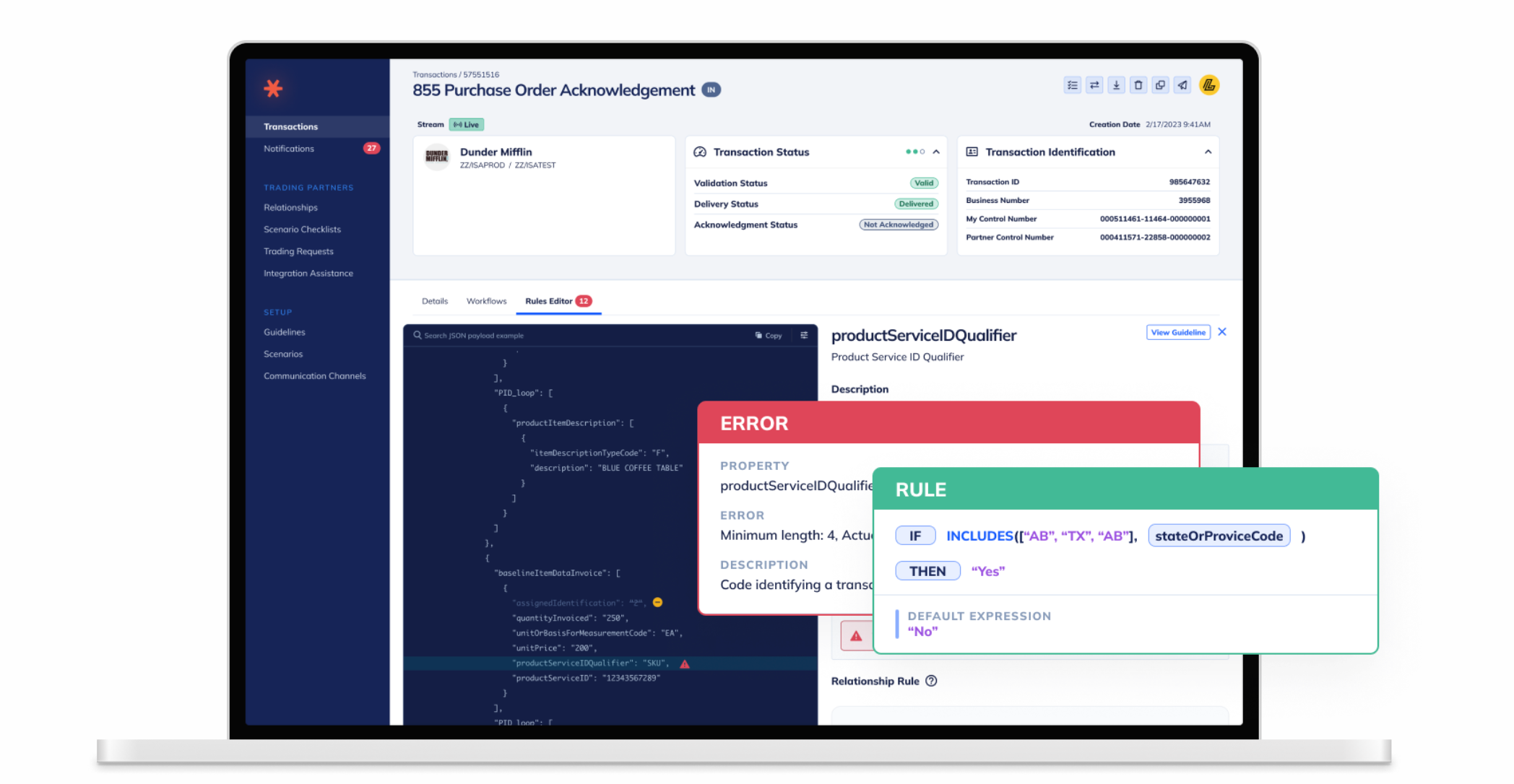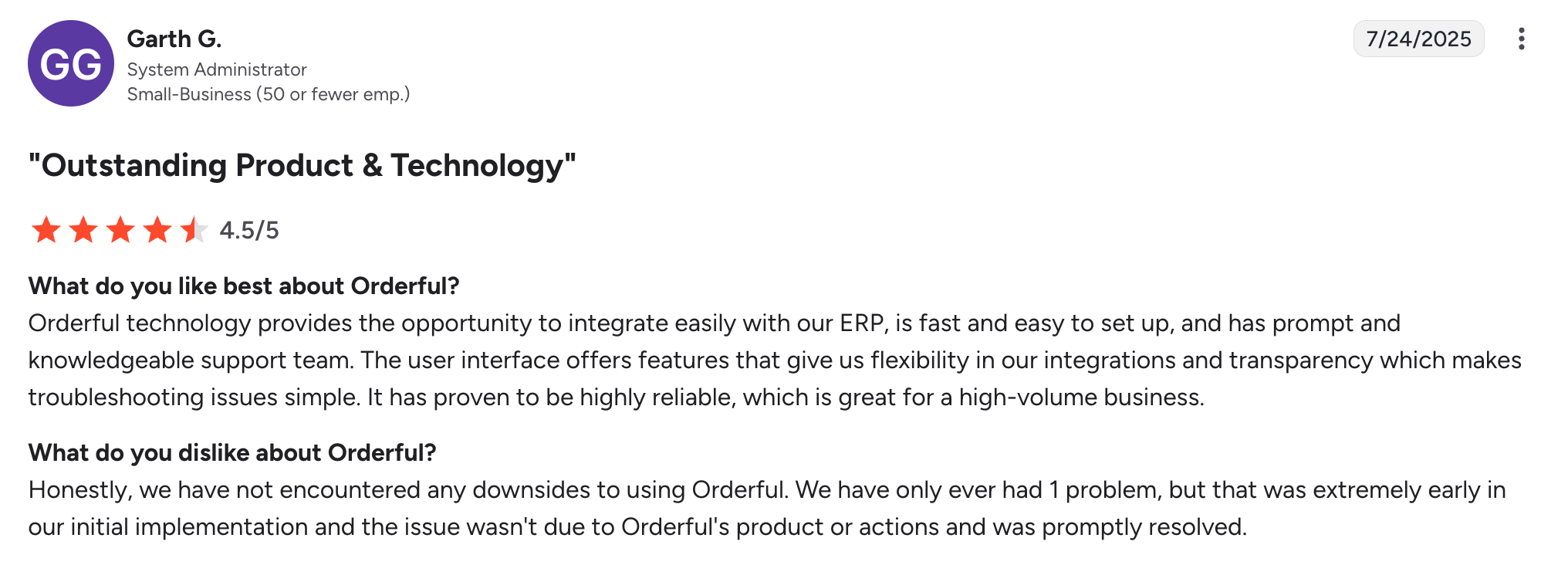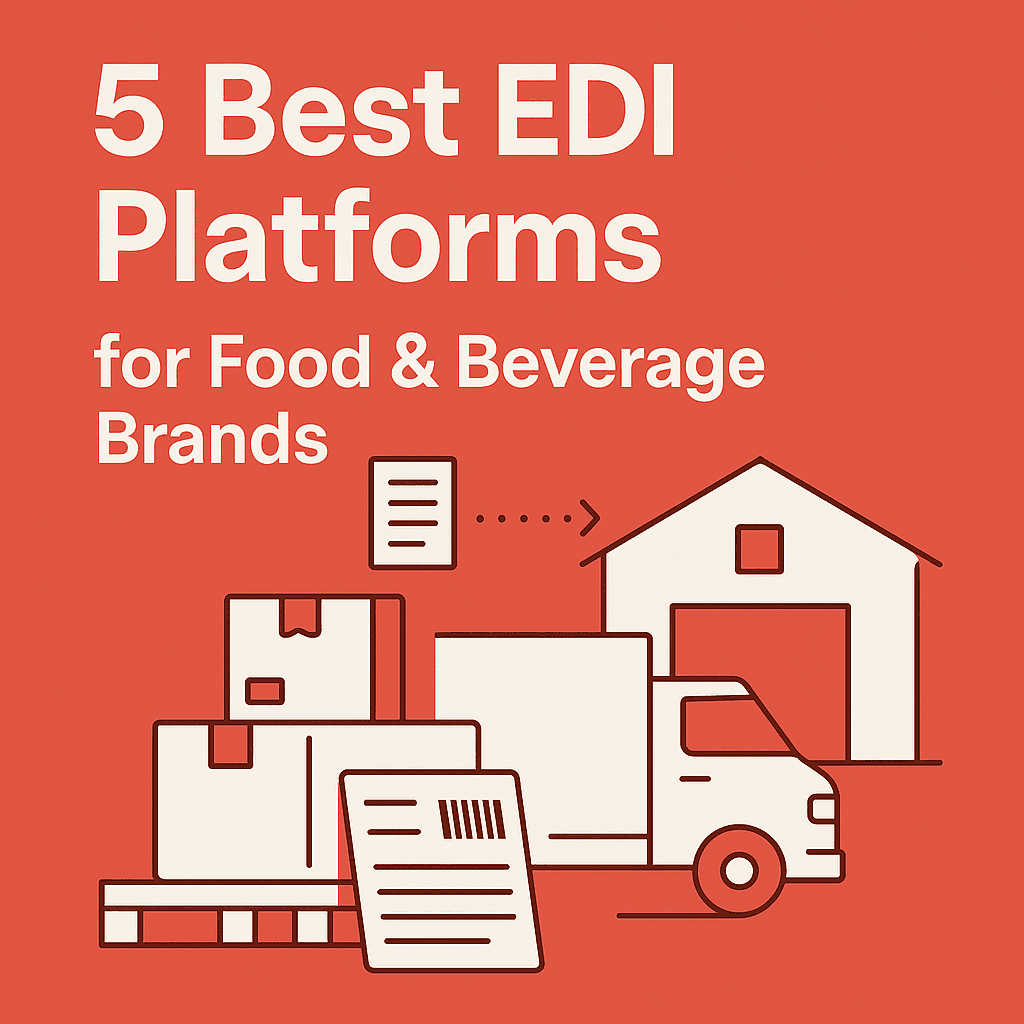Compare top EDI platforms for the food and beverage industry. Learn how to pick the right solution for compliance, integration, and the ability to scale.
The food and beverage industry moves fast, and its supply chains need to move just as quickly. From managing perishables with tight shelf lives to staying ahead of strict regulatory standards, brands in this space face unique operational pressures. When you add in the demands of big-box retailers, the need for accurate, timely communication becomes non-negotiable.
Electronic data interchange (EDI) is the bridge that connects retailer demand and supplier availability, helping food and beverage companies streamline critical processes like purchase orders, shipment notices, and invoices. When implemented correctly, EDI reduces manual errors, improves data accuracy, and enables better supply chain visibility.
Not every EDI system is designed to handle the urgency and complexity of the food sector. This guide highlights five EDI platforms that stand out for their ability to support high-velocity, compliance-heavy operations, built to meet the challenges and high demands of food and beverage brands.
Key EDI Requirements in the Food and Beverage Industry
Food and beverage companies face stricter timelines, regulations, and retailer scrutiny than most other sectors. To stay competitive, their EDI platform needs to support supply chain decisions in real time.
Fast onboarding for product launches or seasonal pushes: Retailer timelines don’t wait. A delay in onboarding a new trading partner can mean missed shelf space or lost promotional opportunities.
Support for ASNs, 810s, 940s, and GS1/UCC-128 labels: To avoid delays or penalties, brands must meet complex documentation and labeling requirements across all shipment types and customer accounts.
Real-time supply chain visibility and batch/lot tracking: Tracking inventory levels, expiration dates, and shipment status helps prevent spoilage and allows for faster response to issues.
Integration with ERP or WMS systems: Integrating EDI with backend platforms enables demand forecasting, inventory control, and synchronized logistics planning.
Pricing predictability: For emerging brands or those managing multiple SKUs, unpredictable costs can erode margins quickly.
Retailer compliance: Non-compliance can lead to chargebacks, shipment rejections, or delisting. This guide to avoiding chargebacks offers practical advice on how to stay in the clear, especially with retail giants like Walmart and Target.
Regulatory accuracy to prevent spoilage or shipment holds: Missteps in documentation or labeling can cause border delays or distribution center rejections, risking both product and reputation.
Top EDI Solutions for Food & Beverage Companies
The platforms below stand out for their ability to support rapid onboarding, ensure compliance, reduce errors, and align operations with the fast pace and urgency of the food and beverage market.
1. Orderful
Orderful offers a modern, cloud-native approach to EDI that removes the heavy technical lift of integrations. Its API-first infrastructure allows brands to onboard many partners within the day, without custom mapping or VAN dependencies.
Food and beverage companies, such as Liquid Death and 8th Avenue Food & Provisions, rely on Orderful to streamline order processing and keep their supply chains moving. The platform supports all major EDI transactions needed for food and beverage operations, including purchase orders, shipment notices, invoices, and warehouse shipping orders.
Orderful’s transparent pricing model makes it easier for emerging brands to predict costs over time. With prebuilt connections and a user-friendly dashboard, it’s ideal for teams seeking simplicity, speed, and the ability to scale. Orderful is consistently rated 5-stars on G2.


2. SPS Commerce
SPS Commerce is an established name in the EDI space, especially within the grocery and retail sectors. It connects to thousands of retailers and suppliers through a vast trading partner network, making it a frequent choice for companies focused on big-box expansion.
SPS offers a fully managed service model, ideal for teams without in-house IT support who are willing to hand off some of their control. Its reliance on traditional VAN infrastructure can limit flexibility compared to modern API-based solutions.
SPS’s pricing details aren't publicly available, and some businesses report concerns about pricing. This guide to high EDI costs explores why cost transparency is a top priority for businesses when evaluating any EDI platform.
3. TrueCommerce
TrueCommerce is known for its built-in integrations with popular ERP and accounting systems like NetSuite, Sage, and QuickBooks. It's a practical choice for distributors in the food and beverage sector looking to unify order and inventory data without major IT overhead.
Following its acquisition of DiCentral, TrueCommerce also supports advanced logistics scenarios, such as temperature-controlled shipping and third-party logistics (3PL) coordination, particularly helpful for managing perishable products or working with foodservice providers.
TrueCommerce offers solid out-of-the-box shipping and inventory tools, but its interface may feel dated to some users. Reviewers have noted that the UI is simple enough that users with limited experience can get a better understanding of how EDI works by using it. However, for end-to-end EDI coverage and extended logistics support, it’s still a capable and widely adopted solution.
4. Cleo Integration Cloud
Cleo Integration Cloud stands out for its ability to unify EDI, API, and file-based integrations. This makes it a strong option for food and beverage manufacturers with a complex inventory management and ERP system.
Cleo gives users high visibility and control over their EDI environment. Its centralized dashboard supports real-time monitoring, exception handling, and customizable workflows. With built-in tools that automate data exchange, it's easier to manage large volumes of EDI transactions without sacrificing accuracy or performance.
The platform offers extensive capabilities. However, it may be more than what smaller brands without dedicated technical staff need. For enterprises focused on deeper integration and long-term planning, this guide to ERP and EDI integration highlights why IT leaders favor cloud solutions.
5. Babelway
Babelway, now part of Tradeshift, is a highly configurable EDI platform designed to support sophisticated business-to-business (B2B) integration, transformation rules, and integration logic. For companies operating in the food and beverage sector, Babelway offers the flexibility to customize every stage of the EDI process, from managing unique supplier arrangements and contract packaging workflows to accommodating specialized labeling requirements.
What sets Babelway apart is its support for non-standard formats and its ability to build tailored workflows, which are valuable features for companies operating across different regulatory zones. Its architecture supports both traditional EDI and modern API integration, giving IT teams more control over how data is exchanged.
That flexibility does come with a tradeoff. Babelway is best suited for organizations with internal integration expertise. The platform has a steeper learning curve than some of its peers, but for technically equipped teams, it offers extensive control over how business documents are structured, routed, and delivered.
Comparison Table: Key Features at a Glance
Each EDI provider brings different strengths to the table, from onboarding speed and label compliance to pricing structure and retail network reach. For food and beverage companies managing tight delivery windows and strict retailer mandates, even small feature differences can impact overall efficiency.
Platform | Best For | Speed to Launch | Retailer Network | Label Support | Pricing Model |
Orderful | Fast onboarding, modern UX | Fast | Large | Yes | Transparent |
SPS Commerce | Retail network size | Slow–Medium | Largest | Yes | Custom quotes |
TrueCommerce | Built-in shipping + ERP | Medium | Large | Yes | Moderate |
Cleo | Complex integrations, IT control | Medium | Growing | Yes | Enterprise-level |
Babelway | Custom workflows, format flexibility | Medium | Moderate | Custom Setup | Custom pricing |
How to Choose the Right EDI for Your Food or Beverage Brand
The right EDI platform depends on your team’s resources, retail strategy, and supply chain complexity. These decision points can help narrow the field:
How quickly do you need to onboard partners? If you're launching new products or entering retailer portals on a deadline, onboarding speed may be your top priority.
Do you have technical resources in-house? Some platforms offer hands-on control and customization, while others take a fully managed approach. Choose based on the support your team can handle.
Are you required to support regulated labeling? If your trading partners demand strict label compliance, such as GS1 or GS1-128, confirm the platform can automate label generation and manage shipment-level documentation.
What does pricing look like over time? Look for transparent pricing models that scale with your business and offer the best long-term cost savings you can get, rather than per-document fees that may eat into your margins.
Can the solution integrate with your ERP or warehouse systems? Strong integration ensures your inventory, order, and shipping data stay synchronized.
Most importantly, verify that the platform you choose meets all of your high-priority business and operational needs and that it connects seamlessly to your current systems. This implementation guide covers what to look for when connecting EDI to existing infrastructure.
FAQs
What EDI documents are essential for food and beverage companies?
EDI documents essential for food and beverage companies include purchase orders (EDI 850), invoices (EDI 810), advance ship notices (EDI 856), and warehouse shipping orders (EDI 940). GS1/UCC-128 shipping labels are also required by many retailers.
Can EDI help food brands avoid chargebacks?
EDI helps food brands avoid chargebacks by ensuring timely document delivery, shipment accuracy, and label compliance. This reduces rejected shipments, late fees, and retailer penalties.
How fast can food brands onboard with EDI?
Food brands can onboard with EDI in a matter of days when using a modern platform like Orderful. Fast onboarding is essential for new product launches, seasonal pushes, and retailer compliance.
What should food companies look for in an EDI platform?
Food companies should look for EDI platforms with label automation, ERP integration, transparent pricing, real-time visibility, and prebuilt retailer connections.
What’s the difference between EDI and API in food logistics?
EDI in food logistics handles standardized transactions like POs and ASNs between trading partners. APIs connect internal systems for real-time updates. Modern platforms often support both.
Smarter EDI for Complex Food Supply Chains
Choosing the right EDI solution is vital for protecting margins, keeping shelves stocked, and ensuring every shipment meets retailer and customer demand. For food and beverage brands, the stakes are especially high. Missed deliveries, incorrect labels, or manual errors can lead to spoilage, chargebacks, or lost shelf space.
Orderful is built to simplify that complexity. With prebuilt retail connections, a cloud-native architecture, and real-time visibility across your supply chain, our platform is built for brands that need speed, accuracy, and scalability without the usual delays or technical headaches. Speak with an EDI expert to get started today.

